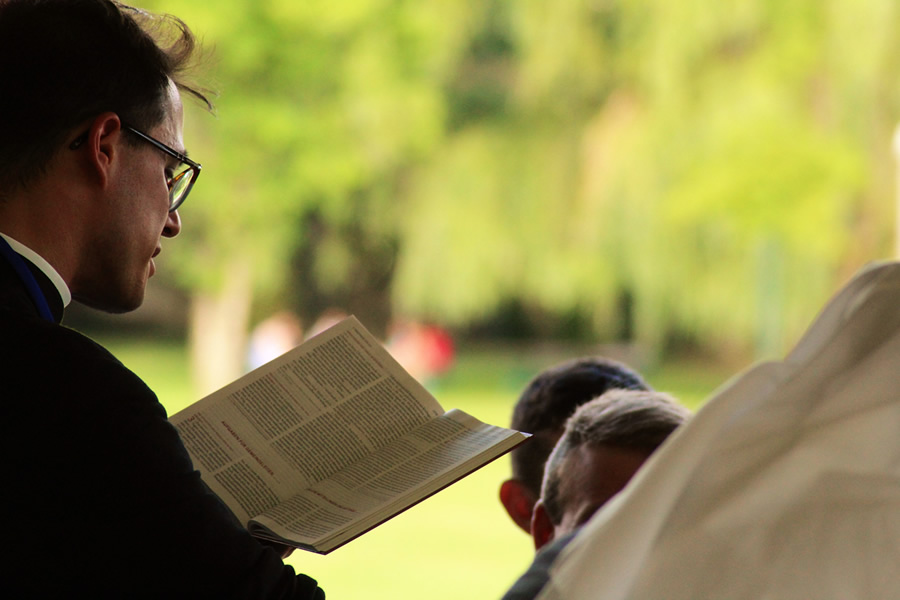
Declaration Fiducia Supplicans On the Pastoral Meaning of Blessings
01-21-2024Letter from the PastorFr. Don Kline, V.F.Dear Brothers and Sisters,
The recent declaration from the Vatican this past December entitled Fiducia Supplicans has caused a lot of anger and bewilderment throughout the world. The confusion has led many to wonder about the legitimacy of and reason for the document. Many good and faithful Catholics are clearly frustrated by this document’s wording. For many, the most frustrating and concerning things include the lack of consensus among the bishops worldwide on how to understand and implement the document. Therein lies the problem. Words matter. Many intelligent people are reading this document and finding it difficult to decipher its meaning much less how to implement it in a pastoral way.
I can only guess that part of the reason for the document is to speak to the pastoral meaning of blessings*. As the document tries to clarify the meaning of blessing, it also presents the possibility of offering a blessing to those who are in irregular situations (a Catholic who is married civilly, but not married in the Church) and samesex relationships. This is where the confusion begins for many. The document has left many faithful Catholics and clergy asking who or what exactly is being blessed and how are they blessed.
Because of the confusion, the Dicastery for the Doctrine of the Faith (who issued the document) has now issued a clarification regarding the document. The clarification states that “some catechesis will be necessary that can help everyone to understand that these types of blessings are not an endorsement of the life led by those who request them. Even less are they an absolution, as these gestures are far from being a sacrament or a rite” (Section 6).
The way to proceed coherently is to allow that which is clear in the teaching of the Church to clarify that which is confusing. This is our key to understanding Fiducia Supplicans. The document clearly states that both “rites and prayers that could create confusion between what constitutes marriage—which is the ‘exclusive, stable, and indissoluble union between a man and a woman, naturally open to the generation of children’—and what contradicts it are inadmissible” (FS,4). This is in faithful accord with the Church’s teaching on marriage as God has created it to be. The document further states that “the Church’s doctrine on this point remains firm” (FS,4).
The document then speaks about the gift of blessings and how blessings are also a sacramental of the Church. As a sacramental, a blessing is meant to dispose us to receive the grace of the Sacraments. While it is necessary to be in the state of grace to receive the Sacraments, even someone in a state of sin may ask for a blessing. And when a blessing is offered to a sinner, it is the sinner who is blessed, not the sin that they commit. The Church, her ministers, the pope, no one can ever bless sin.
The part of the document that many express concerns over is that it considers the possibility of blessing couples in irregular situations and those with same-sex attraction. The guidance given is that “the ordained minister could ask that the individuals (notice here the blessing of the individuals and not the union) have peace, health, a spirit of patience, dialogue, and mutual assistance—but also God’s light and strength to be able to fulfill his will completely” (FS, 38). It further states that those to be blessed are those who recognize “themselves to be destitute and in need of his help—do not claim a legitimation of their own status…” (FS, 31). It also states earlier that we should avoid “all serious forms of scandal and confusion among the faithful” (FS, 30) and that any “prayers that could create confusion between what constitutes marriage…are inadmissible” (FS, 4).
I suspect that the declaration Fiducia Supplicans is an attempt by the Holy Father to reach out to those who feel alienated from God and the Church. There is an invitation to those who have strayed from His Church and from Our Lord to repent of all sin and believe in the Gospel and receive the true gift of life in Jesus Christ who has come to offer this gift to us repentant sinners. In no way should the declaration be seen or interpreted as a legitimization of irregular situations or a blessing of sinful unions as the document states that such prayers are inadmissible.
Perhaps it is important to acknowledge that no pope is perfect. At times, our Holy Father has struggled with understanding how to relate to many in this generation where social media is so available and often so quick to post fake news. He has failed to grasp how many people may read a Church document incorrectly and how the media might manipulate his words and intentions. For this reason, let us continue to pray for wisdom for the Holy Father and that he may remain under the protective mantle of the Blessed Mother.
*Please note that sometimes people misuse the word “blessing” to describe a convalidation of a civil marriage. A convalidation is the way in which a civil marriage becomes a valid Sacrament in the Church. This is not how Fiducia Supplicans uses the word “blessing” and therein lies the confusion. Words matter.
God Bless,
Fr. Don Kline, V.F.
BACK TO LIST